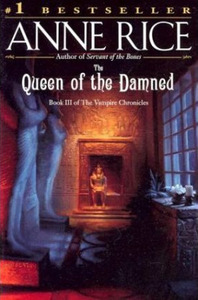Take a photo of a barcode or cover
A truly fascinating chapter in the Vampire Chronicles . . .
I first read this book 25 years ago in 1990. I read it immediately after "The Vampire Lestat" but before "Interview With The Vampire" - it seemed a logical expansion of the mythos of the Chronicles, with the "Creation Myth" of the vampires told from their own perspective. Brilliantly and gorgeously told. Very much recommended. The movie of the same name was a huge disappointment by comparison.
I first read this book 25 years ago in 1990. I read it immediately after "The Vampire Lestat" but before "Interview With The Vampire" - it seemed a logical expansion of the mythos of the Chronicles, with the "Creation Myth" of the vampires told from their own perspective. Brilliantly and gorgeously told. Very much recommended. The movie of the same name was a huge disappointment by comparison.
dark
slow-paced
Plot or Character Driven:
A mix
Strong character development:
No
Loveable characters:
Yes
Diverse cast of characters:
No
Flaws of characters a main focus:
Yes
I officially can't get into Anne Rice's writing. Gave it 60 pages, it made my gym time torturous. And I enjoy my gym time.
dark
mysterious
tense
medium-paced
I was fairly obsessed with this book when i first read it in the mid-90s. This is where Rice fully fleshes out her unique mythology: the Legend of the Twins, the ancient Egyptian connection, the First Brood, etc. I love that we spend time with so many fascinating characters like Marius, Khayman and Armand. I love the way Rice ratchets up the suspense leading to Lestat's concert and I love the Talamasca. There's something so romantic and appealing about an ancient secret society of librarians who study and archive the paranormal.
adventurous
challenging
dark
emotional
funny
mysterious
reflective
sad
tense
slow-paced
Plot or Character Driven:
A mix
Strong character development:
Complicated
Loveable characters:
Yes
Diverse cast of characters:
Complicated
Flaws of characters a main focus:
Yes
the tone of this one is very interesting and oscillates between funny (intentional or not) and lighthearted and unbearably tragic, and i thought the horror element was very effective. akasha is an utter sociopath with zero redeeming qualities, that is to say she’s quite a compelling vampiric villain to contrast the rest of the morally ambiguous and morally diverse cast.
Anne Rice is a lot like George Lucas. Her Big Ideas are great. Her world-building is wonderful. Unfortunately, her actual writing can be a chore.
This book is 500 pages. It could have been 250, except that for every page of action, there is a page of the characters ruminating on their feelings regarding said action. The novel didn't need a ten page preamble to the prologue. It also didn't need the long, boring denouement.
This book is 500 pages. It could have been 250, except that for every page of action, there is a page of the characters ruminating on their feelings regarding said action. The novel didn't need a ten page preamble to the prologue. It also didn't need the long, boring denouement.
“I can’t help being a gorgeous fiend. It’s just the card I drew.”
OK, Lestat, no need to convince anyone, we’re all already in love with you if we made it this far.
The third book of Rice’s “Vampire Chronicles” is a hugely ambitious piece of historical fantasy and horror. There is a special place in my heart for the first three books (though I might be convinced to keep reading them this time – thanks to the amazing AMC series), and this novel, which focuses on the titular Queen, Akasha, is a masterpiece. The pacing is perfect, even when it delves into historical exposition, and the characters are vivid and strongly developed. We see a little less of the Brat Prince than we did in “Vampire Lestat”, of course, as this part of the story is not always from his perspective, but here, Rice opens up her fictional universe across the world and across history in a way that keeps me glued to the page.
After leaving us on a bit of a cliffhanger at the end of “Vampire Lestat”, Rice reveals that Lestat’s music has awaken the long dormant Akasha from her torpor. Roused by his rebelliousness, she escapes the shelter in which Marius kept her and Enkil and leaves a trail of destruction on her way to find Lestat. Weaved in through this part of the story is a fascinating revelation about this historical origin of vampires: how did Akasha and Enkil becomes the creatures that Marius guarded for so long? Rice’s story involves magic, spirits, murder, cannibalism – and it’s over the top and crazy, but oh so good and so much fun to read. She opens up the world to other characters’ POVs, introducing us to new one, such as Jesse Reeves and Khayman, and revisiting familiar ones, like Marius and Daniel Molloy, digging at their stories and showing us what they were up to while Lestat prepared his grand “coming out”. We then follow him when Akasha manifest herself. I had forgotten that the title of this book comes from the curse Mekare puts on Akasha: for the sacrileges she has committed, she is now the Queen of the Damned. I do love the operatic level of drama of it all, it really is perfect if this is the sort of thing one enjoys – and I think you have to if you are going to read Anne Rice.
Of course, for Lestat fangirls such as myself, this is just the continuation of his adventures, with lots of new actors thrown in. Reading it makes me even more impressed by Sam Reid’s performance in “Interview with the Vampire”, because he clearly really understands that Lestat is an unrepentant show-pony, a thespian who delights in attention and in the act of performance, who uses those things to protect himself and whatever softness and humanity remains within him. I can’t wait to see how they work this book into the series! But if you enjoyed “The Vampire Lestat”, this is also a must-read (even if I prefer book two above all others).
I’ll be picking up copies of “The Tale of the Body Thief” and “Memnoch the Devil”, as they both from Lestat’s point of view. Whether or not I keep reading the Vampire Chronicles after that is uncertain: I obviously have a favorite, and if he’s not the focus of the story, I am not sure I’ll be all that invested. We shall see!
OK, Lestat, no need to convince anyone, we’re all already in love with you if we made it this far.
The third book of Rice’s “Vampire Chronicles” is a hugely ambitious piece of historical fantasy and horror. There is a special place in my heart for the first three books (though I might be convinced to keep reading them this time – thanks to the amazing AMC series), and this novel, which focuses on the titular Queen, Akasha, is a masterpiece. The pacing is perfect, even when it delves into historical exposition, and the characters are vivid and strongly developed. We see a little less of the Brat Prince than we did in “Vampire Lestat”, of course, as this part of the story is not always from his perspective, but here, Rice opens up her fictional universe across the world and across history in a way that keeps me glued to the page.
After leaving us on a bit of a cliffhanger at the end of “Vampire Lestat”, Rice reveals that Lestat’s music has awaken the long dormant Akasha from her torpor. Roused by his rebelliousness, she escapes the shelter in which Marius kept her and Enkil and leaves a trail of destruction on her way to find Lestat. Weaved in through this part of the story is a fascinating revelation about this historical origin of vampires: how did Akasha and Enkil becomes the creatures that Marius guarded for so long? Rice’s story involves magic, spirits, murder, cannibalism – and it’s over the top and crazy, but oh so good and so much fun to read. She opens up the world to other characters’ POVs, introducing us to new one, such as Jesse Reeves and Khayman, and revisiting familiar ones, like Marius and Daniel Molloy, digging at their stories and showing us what they were up to while Lestat prepared his grand “coming out”. We then follow him when Akasha manifest herself. I had forgotten that the title of this book comes from the curse Mekare puts on Akasha: for the sacrileges she has committed, she is now the Queen of the Damned. I do love the operatic level of drama of it all, it really is perfect if this is the sort of thing one enjoys – and I think you have to if you are going to read Anne Rice.
Of course, for Lestat fangirls such as myself, this is just the continuation of his adventures, with lots of new actors thrown in. Reading it makes me even more impressed by Sam Reid’s performance in “Interview with the Vampire”, because he clearly really understands that Lestat is an unrepentant show-pony, a thespian who delights in attention and in the act of performance, who uses those things to protect himself and whatever softness and humanity remains within him. I can’t wait to see how they work this book into the series! But if you enjoyed “The Vampire Lestat”, this is also a must-read (even if I prefer book two above all others).
I’ll be picking up copies of “The Tale of the Body Thief” and “Memnoch the Devil”, as they both from Lestat’s point of view. Whether or not I keep reading the Vampire Chronicles after that is uncertain: I obviously have a favorite, and if he’s not the focus of the story, I am not sure I’ll be all that invested. We shall see!
Akasha lowkey was right though…
This one was a trek. Rice’s style was just far too self-indulgent at this point; you can see it creeping in during book 2. The final debate with Akasha was entertaining and I loved the story of the origin of vampires in ancient Egypt. However, the lead up is just far too long. The sections with the Talamasca and Armand and Daniel didn’t contribute anything to the plot!
This one was a trek. Rice’s style was just far too self-indulgent at this point; you can see it creeping in during book 2. The final debate with Akasha was entertaining and I loved the story of the origin of vampires in ancient Egypt. However, the lead up is just far too long. The sections with the Talamasca and Armand and Daniel didn’t contribute anything to the plot!








